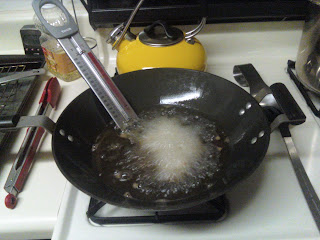Chef Peng - a Hunan-born chef who invented the dish while cooking for the exiled Nationalist party in Taiwan (read the NYT excerpt) - altered his creation for the very different taste buds he encountered when he moved to America. The Taiwanese version of the dish does not have any sugar; the adapted version for Americans does - not much, just a few teaspoons, but that's enough to give the sauce the characteristic sweetness for which it is so famous. Fuchsia has a recipe for each version in her cookbook and this week I tried both on back to back evenings. (Note: the recipe linked in the post title is for the Taiwanese version, not the Americanized version.)

The first step, obviously, is deep frying. I didn't think this out very well on the first night and did the frying in the wok. Which works in theory, only the wide opening and low sides meant splatters went everywhere - I have a splatter guard but it doesn't fit over all of the wok. On the second night, I wised up and did the frying portion in a different pot with high sides, and then did the sauce and final mixing in the wok.
General note about frying - if you do this with any kind of regularity, do yourself a favor and buy two things from your local cooking supply store. One is an oil thermometer. This is a different device from a probe thermometer (also useful, but for different applications) and it removes all guesswork about oil temperature. In frying the chicken pieces, I could watch the oil temperature fluctuate with each new addition of room-temp chicken to the hot oil, and could allow the oil to get back to the right range before adding the next batch, etc. No wonder my first attempts at
 frying were such a disaster - oil temperature is key. The other insanely useful device is the thing I'm holding chicken pieces with in this picture. Williams Sonoma calls theirs a "spider skimmer" and it's essentially a wire basket on the end of a stick. It is the best tool for scooping things out of hot oil. The thin wire lets most of the oil escape, so you don't end up with little pools hiding in your ladle that then drip all over the paper towels you laid out to keep your freshly fried food crisp. With these two tools, any pot with high sides and a splatter guard, I've been able to fry with confidence. Well, more confidence than I initially had, anyway.
frying were such a disaster - oil temperature is key. The other insanely useful device is the thing I'm holding chicken pieces with in this picture. Williams Sonoma calls theirs a "spider skimmer" and it's essentially a wire basket on the end of a stick. It is the best tool for scooping things out of hot oil. The thin wire lets most of the oil escape, so you don't end up with little pools hiding in your ladle that then drip all over the paper towels you laid out to keep your freshly fried food crisp. With these two tools, any pot with high sides and a splatter guard, I've been able to fry with confidence. Well, more confidence than I initially had, anyway.The technique for both recipes is pretty much identical. The only differences are minor ones, in the ingredients lists. One has sugar, one doesn't - one has twice as much potato flour as the other - small variances like that. The sauce ingredients are slightly different - the Americanized version calls for Chinkiang (black) vinegar, the Taiwanese for clear rice vinegar.
At the end of the day, we liked the Americanized version better, hands down. The Taiwanese version was good - it had a heat and slight sourness that was delicious, but "General Tso's", to us as Americans, means a sweet-hot sauce. That's just what we're used to and what we associate with this dish. I should point out though - whereas the General Tso's you get from takeout restaurants here in the US has a syrupy-sweet sauce, this is definitely not that. This is not syrupy.
When I
 made another of Fuchsia's recipes - for Gong Bao Chicken - I realized through trial and error that increasing the sauce in proportion to the other ingreidents threw off the whole balance of flavors. General Tso's, though, is much less of a balancing act, flavor-wise. Sichuan cuisine is all about seasoning complexity, whereas Hunanese flavors are much more straightforward. So I might try doing more of the sauce in future, and see how that goes. There wasn't enough to moisten the rice, and we really liked that sweet-spicy sauce!
made another of Fuchsia's recipes - for Gong Bao Chicken - I realized through trial and error that increasing the sauce in proportion to the other ingreidents threw off the whole balance of flavors. General Tso's, though, is much less of a balancing act, flavor-wise. Sichuan cuisine is all about seasoning complexity, whereas Hunanese flavors are much more straightforward. So I might try doing more of the sauce in future, and see how that goes. There wasn't enough to moisten the rice, and we really liked that sweet-spicy sauce!Additional side perk of home wok experimentation: any night I don't know what to do for dinner, Matt now suggests trying a new Chinese dish.
No comments:
Post a Comment